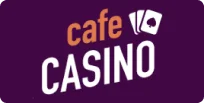

 651
651 19
19Highlights:

Highlights:
Bonus:
350% up to $2,500 651
651 19
19
 350
350 25
25Highlights:

Highlights:
Bonus:
$5,000 Package 350
350 25
25
 231
231 9
9Highlights:

Highlights:
Bonus:
$8,000 Welcome Bonus 231
231 9
9Almost all online casinos in the US offer roulette. But if you want to play and succeed at roulette online, you need to find the best online casinos that focus on the game. The below casinos have got it all — from the widest selection of roulette variations to the best range of betting limits. They offer safety and security, plus bonuses that will make your roulette bankroll go further.
Café Casino is a leading online casino that was launched in 2016 and is licensed by the government of Curacao. It hosts a myriad of software game developers, including Rival Gaming, RealTime Gaming, and Spinomenal.
Roulette Game Selection
Cafe Casino is an excellent choice if you want to play the best roulette online games, with two variations each of American and European roulette. Bets can start from as little as $1 and go all the way up to $500.
If you want to up the action, there are live-dealer games, which again offer a choice of American or European roulette. These games are great if you’re looking to play in a more authentic gaming atmosphere.
Welcome Promotion
Once registered, you have the option of two welcome bonus offers. If you want to make a deposit using Bitcoin or any other cryptocurrency, you can claim a 350% match-deposit bonus up to $2,500.
Alternatively, you can claim a 250% match-deposit bonus up to $1,500 when you opt for a fiat deposit.
Both the fiat and the crypto welcome-bonus offers are subject to a 40x playthrough requirement. Some games contribute towards wagering requirements, while others don’t. Bonus funds cannot be used to play live-dealer casino games, for example.

Other Promotions
Once you’ve used up the welcome bonus offer, you can expect a wide range of promotions to drop into your inbox. These include Weekly Mystery Bonuses as well as $100 in bonus cash for referring your friends.
Banking Methods
At Cafe Casino, you have access to a diverse range of banking methods. The minimum deposit required to get started is between $10 and $50, depending on the payment method you choose. You can use a variety of payment options, including bank debit and credit cards, cryptocurrencies like Bitcoin, Ethereum, Bitcoin Cash, and Litecoin, and bank wire transfers.
Bitcoin, Bitcoin Cash, and Litecoin offer the lower minimum deposit, although this can change so be sure to check the site.
To withdraw your winnings, you must have a minimum of $10 or $50 in your account, again depending on your preferred withdrawal method.
Most payment methods are available for withdrawals, except for bank debit and credit cards. Assuming your casino account has cleared all verification checks, your withdrawal request will be processed within four working days.
BetUS Casino is primarily a sportsbook, but it also hosts a wide range of casino gaming options. It has been in operation since 1994 and holds a valid gambling license from the Curacao Gaming Control Board.
Roulette Game Selection
Whether you want to play RNG roulette games or live-dealer casino games, you are in luck. BetUS Casino has a strong portfolio of roulette games powered by both Dragon Gaming and Rival Gaming.
Among the top variations are Dragon Roulette, European and American roulette, and Roulette High Roller. These are games to suit all pockets. Bets can start from as little as $1 per spin, while high rollers can place maximum bets of $500.
You can also play either European or American Roulette in the live-dealer casino section. Select between various table limits starting at $1 and going all the way up to $1,000.
Welcome Promotion
BetUS Casino has two separate welcome-bonus offers. If you’re making a deposit via a fiat currency, you can claim a 150% sign-up bonus up to $3,000 when using casino bonus code CAS150.
Alternatively, you can make a deposit with your preferred digital currency to claim a 250% match-deposit bonus up to $5,000 when using casino bonus code CAS250.
The terms and conditions vary between the two, so it is important that you read the small print. However, a wagering requirement of 40x applies on both deposit bonus offers which must be completed within 14 days. Live-dealer casino games are not part of the package.

Other Promotions
All players can enjoy a 20% crypto cash bonus when using casino bonus code 20CASH, as well as a 100% crypto bonus on the next two deposits when using promo code 100CRYPTO2X.
This is only the tip of the iceberg. There are many more casino bonuses and promotions to choose from. It is important to remember to apply the right casino bonus code when making a deposit to ensure you add value to your gaming sessions.
Banking Methods
You have several options at your fingertips for making deposits and withdrawals. You can deposit via bank debit and credit cards, bank wire transfers, cash transfers, Bitcoin, Bitcoin Cash, Litecoin, and Ethereum. The minimum deposit is $10.
To cash out your winnings, you must have a minimum of $50 in your account. Note there may be a cashout fee on certain withdrawal methods.
Established in 2020, Las Atlantis holds a gaming license obtained from the Government of Curacao, ensuring its legitimacy and adherence to international gambling standards. Enjoy a worry-free gaming experience at Las Atlantis.
Las Atlantis warmly welcomes new players with a generous welcome bonus on crypto deposits. To help you get started, there are five 280% bonuses available, allowing you to claim up to $2,800 each, for a total of $14,000. These deposit bonuses come with a 35x playthrough requirement, and to be eligible, you must deposit at least $10.

With a vast selection of over 250 casino games, Las Atlantis Casino offers an impressive collection that includes slots, poker, table games, and live dealer options.
In the table games section, you’ll find various Roulette variations, such as European, American, and French Roulette. This casino provides a wide range of online games to cater to your preferences. For a more immersive experience, you can also choose from a selection of Live Roulette titles. Las Atlantis Casino ensures that you’ll always have exciting gaming options available.
Las Atlantis offers diverse payment options with zero processing fees. You can fund your account using Visa and Mastercard, requiring a minimum deposit of $30. Alternatively, if you prefer cryptocurrencies, the site accepts Litecoin, Ethereum, Bitcoin, and Tether. All coins, except for Tether, require a minimum deposit of $20.
When we’re looking for the best online casinos for online roulette, we take a number of factors into consideration. These include overall quality of the online gambling experience, the safety and security measures in place, and the overall entertainment experience.
One of the first things we check is the range of online roulette games available. It’s not just about European and American roulette, we also look for more exotic variations. These might include side bets that add to player engagement, for example.
We also look for sites with a range of the best game developers in the industry, as well as the bet sizes to make sure the games suit all pockets.
All the best online roulette casinos offer free roulette games in demo mode. These help you to learn the ropes quickly in a comfortable, risk-free environment. They also let you perfect your betting strategy and help you gain more insight into how to place your bets.
Top roulette casinos like Wild Casino and Ignition also offer a live-dealer casino section. This means that instead of playing with a computer’s random-number generator, you are connected to a real-life dealer via video stream, who spins a real roulette wheel. The live-dealer games are live-streamed from state-of-the-art studios across the world and are available 24 hours a day, seven days a week.
Some online roulette casinos have betting limits ranging from a few hundred to thousands of dollars. While these might be great for high rollers, most of us prefer stakes that won’t break the bank. The best roulette casinos have games that cater to all pockets.
But if you are a high roller, Wild Casino offers limits that go as high as $5,000 per hand.
While there are some great real money casino apps, most online casinos have built their sites using the latest HTML5 technology, so that they’re fully optimized to work in mobile internet browsers. Either way, it means you can play roulette games on the go.
The best roulette online casinos have a welcome casino bonus available to attract new players as well as promotions to help retain existing players. Most online casinos offer a casino bonus, but you should also be aware that bets on online roulette games may not always contribute 100% towards the wagering requirements.
If you are interested in a bonus, take the time to read the fine print carefully.
Many casinos such as Bovada run VIP programs designed to reward player loyalty. These programs usually enable you to earn points each time you make a real money bet, which allows you to move between different levels and unlock different perks and rewards.
Typical rewards up for grabs include personalized casino bonuses, higher deposit and withdrawal limits, faster cashouts, gadgets, and gifts, as well as a VIP personal account manager at your beck and call.
If you hit a glitch while gaming or have trouble cashing out, having convenient access to a customer service representative is invaluable. That’s why we prioritize casinos that have multiple channels of communication for customer care.
Simply sending an email can sometimes feel insufficient, and waiting for a response can be frustrating. That’s why all of our recommended online gambling sites offer live chat and phone support for immediate assistance. Additionally, they provide thorough “Help” and FAQ pages to swiftly answer any questions you may have.
Whether you’re playing roulette online or live-dealer roulette, you want to have the best possible chance of winning. This is why we only recommend licensed and regulated online casino sites. After all, you don’t want to give your personal information to an unlicensed rogue casino.
A licensed operator is required to have its games and random-number generator checked on a regular basis by an independent third-party auditor, such as GLI and eCOGRA. That means licensed online slot machines cannot be rigged, nor can any game available at a properly regulated casino, including roulette.
Safe online casinos also use the latest SSL encryption technology and firewalls. This means that any information sent to and from the website is protected and safeguarded and cannot fall into the wrong hands.
The best online casinos also take care of their players by making responsible gambling tools available. This gives you an element of control over your spending. Tools may include deposit, loss, and wager limits, plus take-a-break, cooling-off, and self-exclusion options.
Because roulette and other table games typically have a lower house edge than most slots, they have different bonus wagering requirements. In fact, some roulette games may be ineligible to contribute at all towards the wagering requirements or may only contribute as little as 10%.
On the other hand, some online roulette casinos know all too well the importance of giving players a fair and entertaining session and may also have special bonuses that can be spent on these casino games. It’s important that you always take the time to read the bonus terms and conditions before registering for an account or making a deposit.
Online roulette is a popular casino game that has been enjoyed for more than 200 years by players all over the world. It is a simple yet thrilling game that can be found at both online and land-based casinos.
The main aim of both land-based and online roulette is to place bets on where you think the ball will land on a spinning wheel. Once all bets have been placed, the ball is spun in one direction, while the wheel spins in the opposite direction.
Because of its popularity, many variations have appeared over the years and it’s important that you know the key differences between them.
European roulette is the most popular variation of this game since it provides you with the best odds. The roulette wheel only comes with one green zero, which reduces the house edge to 2.70%. That’s considerably low when compared to other variations. It is a solid gaming option that can be found at most online roulette sites.
This is probably the worst possible variation available on the market, odds-wise. You can easily spot an American roulette game because the wheel comes with an extra green zero. The house edge is almost double that of European roulette, at 5.26%.
If you have no other variations available, give it a go, but remember the odds are against you.
French roulette is a rarer variation but it’s highly desirable because of its player-friendly odds. It works similarly to European roulette except there are two extra rules available in this game, En Prison and La Partage. La Partage returns half of your bet if the ball lands on the green zero, provided you placed a wager on one of the even-money options. Meanwhile, if you choose En Prison under the same circumstances, the dealer will let your bet ride onto the next spin.
These rules reduce the house edge to a mere 0.35%, which makes French roulette an excellent choice. That said, it can be difficult to find in both land-based and online casinos, so you may need to hunt around.
Online roulette tournaments are an exciting way to enjoy this classic casino game while competing against other players for prizes.
Online roulette tournaments usually have a set format such as a leaderboard-style competition or a single-elimination bracket. The tournament is split into many rounds, with players advancing based on their scores.
In the majority of cases, you must pay an entry fee in order to participate in an online roulette tournament. This fee contributes to the prize pool. Some tournaments may offer free entry or the chance to qualify via satellite events.
As mentioned, the rules of the tournaments vary from one casino to another. Generally speaking, you will be provided with a set number of chips with the main aim of gaining as many chips as possible. The winner is the player with the highest chip count or the last player standing. Some tournaments may have special rules or limitations on bet sizes or specific types of bet.
The prizes in roulette tournaments vary depending on the format, the entry fee, and the number of participants. One thing is for sure, there are some big cash prizes up for grabs.
If you want to play online roulette for longer, opting for a casino bonus can be rewarding. It is always best to shop around for deals and to look beyond the size of the casino bonus.
Some casino bonuses can appear to be on the smaller side but may have lower wagering requirements, which may make them more achievable. Taking the time to go through the fine print should help you get your hands on the best deals.
Among the most enticing and highly sought-after rewards offered by online casinos is the no-deposit bonus. These are great value for the player because they simply require you to register an account without any obligation to deposit funds.
The no-deposit bonus is frequently used by casinos as a marketing strategy to attract new players to their sites. With this bonus, you can enjoy playing real-money games without risking your own money.
The no-deposit bonus can take the form of free spins on a specific online slot game chosen by the casino or a small amount of bonus money. Wagering requirements are generally higher for this type of bonus, but this is standard practice.
Red Dog Casino welcomes all newly registered players with a $45 no-deposit bonus, enabling you to test out its many games before making a deposit. This no-deposit bonus also allows you to play online roulette and work on your strategy.
The welcome bonus, also known as the match-deposit bonus, is a reward that you receive on making your first deposit at any of your chosen roulette sites. The casino matches your initial deposit by a certain percentage.
For example, Ignition Casino welcomes all new players with a 150% sign-up bonus up to $1,500. This means that if you make a deposit of $100, you receive $150 on top. You can claim up to a maximum of $1,500, making this a very generous offer.
It is important to read the terms and conditions of this type of bonus as there may be exemptions for certain games. This can especially apply to roulette online, which often has different bonus-wagering requirements because of its lower house edge.
A free-spins bonus is the simplest type of bonus to understand. It can be a standalone offer or combined with the match-deposit bonus in a hybrid deal.
As the name suggests, you are given a certain number of free spins on a specific slot game or games. While free spins cannot be used to play online roulette, they enable you to generate wins, which can then be spent on online roulette.
The online casino site typically selects the game or games that the free spins can be used on, although occasionally you may receive a greater number of free spins based on the amount of your deposit.
A cashback bonus is an increasingly common promotion, especially at online casinos that accept Bitcoin. This is not a traditional bonus where you receive bonus money up front when making a deposit. Rather, you are given money back after you have lost the money you deposited. Luckily for us, this type of bonus is widely available at online roulette sites.
Typically, the casino gives you a percentage of your net losses on a specific day of the week. Many casinos give away cashback bonuses as part of a loyalty scheme.
Most online casino sites run loyalty schemes or VIP programs. You are either automatically enrolled into one from the moment you register for an account or else you are exclusively invited to join once you have met a target of deposits.
Each casino will offer a unique reward system with its own perks that depend on the level you have reached in the loyalty scheme. Generally, rewards and comps include higher deposit and withdrawal limits, a personal account manager at your beck and call, tailor-made bonuses with low wagering requirements, VIP customer support, invites to special slot tournaments, and more.
Before picking an online roulette site, you must first decide which payment method to choose. There are many available, each coming with its own set of pros and cons. The key difference that may impact your gambling session is the speed and delivery of both deposits and withdrawals.
Here are some of the most popular methods available on the market today.
Debit and credit cards are accepted everywhere, which makes them the most accessible payment method in the world. This means they’re highly convenient, and since the majority of players already have a bank card, there are no barriers to creating a new account. They’re also one of the safest forms of payment since they offer fraud protection and are backed by global banks and financial institutions.
Deposits with bank cards are quick and painless, enabling you to fund your account and play online roulette with ease. When it comes to withdrawals, they can be a little slower, with funds typically reaching you within a couple of days.
Wild Casino and Cafe Casino both accept bank debit and credit cards for payments.
Bitcoin and altcoins offer users greater anonymity and help protect their identity and personal information while gambling. Transactions are highly secure since they use blockchain technology, which also means they are processed quickly and efficiently with very low fees.
One of the biggest benefits of cryptocurrencies is that the best crypto gambling sites use provably fair gaming technology, enabling you to check the fairness of the games that you are playing, giving you complete transparency. Casinos such as Cafe Casino and Red Dog Casino both accept Bitcoin and other digital currencies.
In recent years, eWallets have become increasingly popular for online gambling because of their speedy deposit and withdrawal processes. Moreover, eWallets offer a high level of privacy and anonymity for users.
When using an eWallet, you don’t have to share your bank card information with the casino as your eWallet serves as a mediator between you and the casino. Skrill, Neteller, ecoPayz, and PayPal are among the most popular eWallets available on the market, though there may be minimal fees for sending and receiving funds.
Some eWallets even offer mobile versions for added convenience. However, it’s important to note that many offshore gambling sites do not accept e-Wallet payments from US-based players. In this case, you can use MatchPay as a peer-to-peer payment gateway or purchase digital currencies or prepaid vouchers with the funds in your e-Wallet to make a deposit.
Bank transfers are among the most widely available payment methods at roulette casino sites, making them a convenient and highly accessible option for many players. Not only are they highly secure, but they also eliminate the need for a third-party intermediary.
They also provide you with an extra layer of protection against fraudulent activity. One of the biggest advantages of bank transfers is that they enable users to make large deposits and withdrawals, making them an ideal option for high rollers.
They may be convenient, but they can also be a little slow when it comes to withdrawing your winnings. These transactions typically take a little longer to process than some other payment methods. Roulette casino sites that allow bank transfers include BetOnline and Cafe Casino.
Making the most of your roulette bankroll involves effective bankroll management as well as strategic gameplay. Here are a few tips on how to boost your chances of winning and extend your online roulette bankroll.
Before you sit down to play online roulette, you have to decide how much money you are willing to risk. You should think about how much you are prepared win or lose before you walk away from the session.
Make sure you stick to your budget, never chase your losses, and never gamble with funds that should be used to pay household expenses.
As we’ve seen, European roulette and French roulette are the best variations available. They come with a lower house edge, thus boosting your chances of winning in the long run.
You should avoid American roulette if you want your bankroll to go further (and who doesn’t?). Choose your roulette variants carefully. You can always try games in free mode before you play real-money games.
Opting for the best bets that give you a higher chance of winning is wise when playing online roulette. For example, placing outside bets is recommended. While the payouts are lower, the chances of winning are much higher.
Outside bets which include red/black and odd/even pay out 1:1 at almost 50/50, which is the fairest bet you’ll find in a casino. Inside bets pay out higher at 35:1, but the chances of landing a win on one specific number are a 36/1 longshot in European roulette and 37/1 in American roulette.
This applies to more than just roulette, but to maximize your bankroll, you must practice effective bankroll management. Have a limit in place, decide how much you are willing to bet per spin, and avoid taking unnecessary risks, such as placing big bets to try to recoup losses.
There are many betting strategies available out there, such as the Martingale. However, there is no such thing as a perfect or “winning” roulette strategy.
The best online roulette sites offer you various bonuses and promotions to stretch out your bankroll. Take the time to browse through the many bonuses available and make sure you understand the terms and conditions before you deposit.
As mentioned, some bonuses exempt games such as online roulette from contributing towards the playthrough requirements.
For some players, nothing quite beats the thrill of playing online roulette for real money with a live dealer. Thanks to improvements in technology and broadband speeds, live casinos and live-dealer games have come a long way.
You can play live-dealer roulette games for real money via your mobile whenever you want and wherever you are. You have access to many roulette variants, giving you ample choice when choosing between different live-dealer games.
Wild Casino offers two live casinos which are fronted by friendly dealers happy to greet and welcome new players to the tablets. You can find quality roulette tables with varied betting limits as well as multiple language options. Every spin of the wheel is live-streamed in HD in real time.
BetUS Casino is another good provider of live-dealer products and roulette games. These live casino games have been optimized to deliver clarity, especially when playing mobile roulette games. You can find a wide range of live table games, including European and American roulette.
Playing real-money online casino roulette games and free online roulette both have their pros and cons. We’ve compiled the key differences between the two below.
Real-Money Roulette
Playing online roulette for real money gives you the thrill of risk versus reward. While you can still “win” when playing free roulette, you won’t get your hands on the cash. However, risking real money means that you can lose real money and you should always try to gamble responsibly.
Free Online Roulette
On the other hand, free online roulette is a great way to practice and develop your strategy without putting your own money on the line. You can play roulette online for fun without any element of risk at various online roulette sites. This is a great option for players who are new to the game and want to test the water.
The choice between real money and free online roulette is about your personal preference, commitment, and your knowledge of the game.
Explore the best online casinos for a variety of real money games:
Roulette is one of the oldest and most popular casino games in the world. Its origins can be traced back to 17th century France.
The first roulette wheel was developed in the 18th century by French mathematician Blaise Pascal, who was trying to create a perpetual motion machine. Ultimately, Pascal’s project failed, but he did inadvertently launch a gambling craze.
The earliest roulette wheels in Europe featured both a single zero and a double zero, along with numbers one through 36, which these days is known as American roulette. Later, a different version with a single zero was introduced in Europe and European roulette was born.
The game gained popularity across Europe in the 19th century, later making its way to the US. In the early days, the game was mainly played by the upper classes, but over time it achieved mass appeal.
In the 20th century, this casino game continued to evolve with new variations and roulette betting options.
Real-money roulette games work by enabling players to place bets on the outcome of the roulette wheel in order to win cash prizes. There are many different variations of roulette games, but picking the best option based on the house edge is a wise move.
Read our comprehensive guide on how to play roulette.
If you have landed here looking for the best online roulette sites, you are in safe hands. Our team of experts has scoured the internet to bring you the best websites where you can play roulette online for real cash. We recommend that you only sign up for an account at online casinos that are licensed and regulated.
Yes. Top online roulette casinos make sure that independent third-party auditors regularly check their games and random-number generators (RNGs). The best roulette sites provide you with a good choice of games and a fair gambling session.
Yes. The best roulette sites allow you to play games for free. This does not apply to live-dealer roulette games. However, you can sit in on the games and watch before you dive in and play.What do I need to have to play online roulette?All you need is an internet connection. You can access all roulette variants via your desktop or mobile device and play on the go.
The word roulette comes from the French for “little wheel.” This refers to the spinning wheel that is the main element of this game.
That depends on the type of roulette you’re playing. European roulette has a return to player (RTP) of 97.3%, while American roulette has a lower RTP of 94.74%.
They could be better at an online casino. There are far more European roulette games at online casinos than you would typically find at a land-based casino in the US, which favor American roulette. European roulette is a more player-friendly game with a lower house edge.
No. As long as you are playing at a licensed and regulated roulette site, these casino games are not rigged.
No. Roulette is a game of luck, but you do get to choose from a range of bets that have different odds of winning. Even-money bets, such as red or black or odds and evens, are among the fairest bets in the casino since they pay out 1/1. But a degree of luck is highly desirable.
If you want to win, bank smaller but less risky wins, placing outside bets in roulette games is advisable. But if you want to longshots for bigger payouts, go for the inside bets. Over time, the house always wins.
Not as such. But some super-smart roulette players who were known for winning big include Ashley Revell, who bet all his wordly goods on “red” and won, Charles Wells, who broke the bank at Monte Carlo, and Joseph Jagger, who got rich when he identified a tiny bias in a casino roulette wheel.

A day after Shohei Ohtani hit a home run in his Los Angeles Dodgers spring debut, L.A. rolled out their other big off-season acquisition, starting pitcher Yoshinobu Yamamoto. It’s not […]

The 1,230 games of the NBA regular season begin with two games on Tuesday, October 24. And as the league begins its 78th season of play, the financial health of […]

The United States losing in the World Cup may end up growing the sport globally. Having a new team, Spain, join the small club of nations that have won the […]

Downtown San Francisco, a bustling hub in one of the world’s most famous cities, has faced a lot of challenges over the past years. One developer, however, thinks an impressive […]

Kansas City Chiefs “superfan” Xaviar Babudar, known as ChiefsAholic on social media and recognizable for the werewolf custom he wore to every game, was arrested over the weekend by authorities […]

Blackstone Inc is reportedly considering selling half of its stake in the real estate of the Bellagio hotel and casino resort in Las Vegas. The giant New York-based investment firm […]

Silverstein Properties, owned by veteran New York real estate mogul Larry Silverstein, 92, is teaming up with Greenwood Gaming, owner of Parx Casino, for a proposed casino on Manhattan’s Westside […]

The Ohio State Lottery is losing tens of thousands of dollars a month offering sports betting kiosks in the state, according to its own monthly stats released this week. The […]
Are you ready to take your online gambling experience to the next level? Sign up for the LetsGambleUSA newsletter and get the latest news, exclusive offers, and expert tips delivered straight to your inbox.